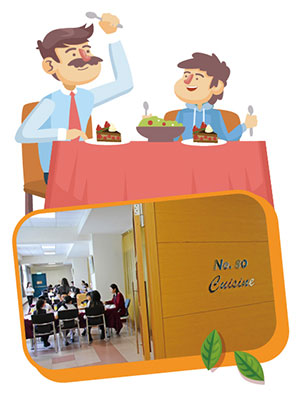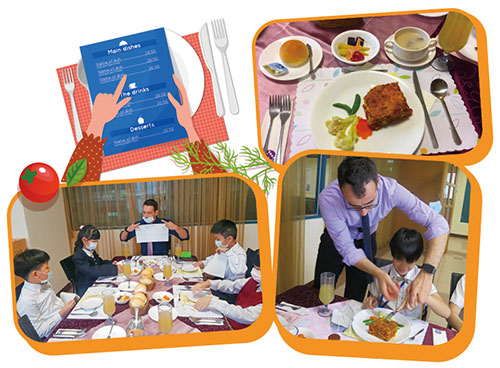
Staying Healthy & Productive While Learning at Home
國際處主任 賴國宜
Due to the recent COVID-19 outbreak, schools had to switch to online classes from May 18. Our teachers worked together to set up a distance learning program for each grade level. Videos, content and live lessons are provided via Google Classroom. Students work at different paces, so, it's important for them to establish routines for completing their work. Please encourage your child to do the assignments and homework right after the live lessons or watching the videos and to leave messages to teachers when they have questions. While change is unsettling, we will continue to evolve and update our distance learning program.
民以食為天,「吃」占了每天生活很重要的一部分,餐桌禮儀不只是禮節,更是良好生活習慣的一環。受飲食習慣和文化的影響,中西餐桌禮儀截然不同,學習西餐禮儀不僅可以了解西洋文化,更可以在跨文化的交流中避免誤解,表現更合宜得體。這一期我們邀請國際處副主任Mr. Claassen來介紹中年級的西餐禮儀課程。平日家長也有很多機會帶孩子到各種餐廳用餐,享受美食之餘,建議您也可透過基本用餐禮儀,培養孩子合宜的用餐習慣,表現出優雅的修養與品味。
近日台灣新冠肺炎疫情嚴重,全國各級學校全面停課,學生改採居家遠端學習。此次我們融合非同步線上課程搭配同步直播的「混成式」學習方法,學生先觀看預錄的教學影片學習新課程,接著依照老師的指示完成線上作業或評量,孩子可以有些彈性依照自己的節奏,完成學習活動。錄播的方式讓老師們有更充分的時間共同備課和設計教學資源,維持一貫良好的教學品質。此外,每週固定時間的同步直播教學,老師帶領課文或專題討論,提供學習回饋並維繫師生互動。
疫情變化快速,無人能預測何時可回復正常生活,讓我們一起維持樂觀的態度,攜手帶著孩子正向防疫,利用此次的線上教學,訓練孩子安排自己的學習節奏,操作數位工具,演練作業內容,不只讓學習不中斷,還能提升孩子的自主學習能力。

~ Roland Claassen
Assistant Director of the International Department

When I first arrived in Taiwan, I would always embarrass myself when eating with Taiwanese as I would constantly make “incorrect” choices around the dinner table. I remember one of my first meals, where I did not know where to put down my chopsticks when stopping to take a sip of water. I stuck them right into my bowl of rice and immediately the whole table became silent. I knew then and there that I had made a terrible mistake. Table manners vary from culture to culture. What is acceptable in one country may be considered extremely rude in another country. Even the cutlery used may be completely different.
At KCIS we believe that teaching students about western culture is central to English language learning. In order to be proficient in English communication, students need to understand the underlying culture. One way we introduce our students to western culture is by giving them the opportunity to dine with our foreign teachers in a natural and real-world setting. Once a semester the grade three and four homerooms are invited to have a formal lunch at a special venue called “No. 80 Cuisine”. Students enjoy a special three-course western meal with our foreign English teachers over the lunch period instead of eating the traditional school meal in their homerooms.
During this meal, our foreign teachers will help students to practice proper western dining etiquette such as the correct way to hold a knife and the importance of keeping elbows off the table. As this is a casual and natural learning experience, it is not seen as a “lesson” for the students but rather an opportunity to understand English cultural aspects. Students are usually very excited about these meals as they get to eat special western dishes such as steak, lasagna, chicken cordon bleu, and other traditional western meals. It’s also just a pleasant time for students to get to know their foreign teachers in an environment outside of the classroom by sharing about their lives in Taiwan. Students and teachers talk about school life and end the meal with a delicious dessert.

As students graduate from elementary school and grow older they will have more opportunities to dine with family and friends or attend formal gatherings. Their dining experience at No. 80 Cuisine and the etiquette learned from our foreign teachers will help them be more confident in social situations and will serve them well for the rest of their lives.

![]() 全文下載)
全文下載)